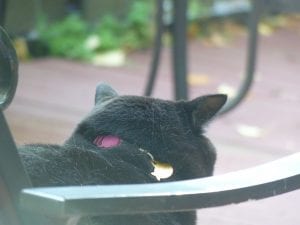Hello friends and blog visitors! Welcome back to my blog. To follow up on the theme of my previous couple blog posts, and as you may or may not have guessed from my title… Humanities 10 brings us on yet another journey through history with Shakespeare’s beloved “Romeo and Juliet”. Or, parodies of it!
But before creating our parodies, we went through the process of understanding Shakespeare, the Elizabethan era, and most importantly his beloved play “Romeo and Juliet”. Stick around if you’re interested as to how we went about this project.
Launch
The driving questions for this unit was…
“How can we, as Shakespearean actors, use parody to communicate the timeless nature of Shakespeare’s “Romeo and Juliet”?”
So… Why Shakespeare?

One of the first things we discussed in class was… why do we study Shakespeare? What’s the point? It’s a fair question, one that high schoolers have sure been asking for a while now. Why learn about this dead guy? Why was he so special? What makes him so different, so influential, compared to his fellow playwrights and poets?
You can read my answer in a short essay Why Shakespeare?, but I think that this was a fit way to prepare for diving into his story, ‘Romeo and Juliet’. To understand the writing, I guess we have to first understand its author.
Building Knowledge
Movie Watching!
So, of course in HUM 10 we can’t go about this normally and just read all of the play… we watched the movie and read the play at the same time! As we read the story, scene by scene, we watched the corresponding scenes in both Baz Luhrmann’s Romeo and Juliet (1996), and Franco Zeffirelli’s Romeo and Juliet (1968). As someone who really likes the 1996 version, I was excited as ever to see it once again with my peers. Having experience with the story was quite helpful, as I saw a performance at bard on the beach of Romeo and Juliet a couple years ago too, which was amazing. So already I was anticipating watching the movies and reading the story.
This Week I Learned…..
On top of daily watch and read sessions, we were tasked with completing three weekly “TWIL” posts about what we learned from each week. You, of course, can check them out below! I thoroughly enjoyed being able to recap my learning each week with a short blog post.
| The Importance of Retelling Classics | ||||||
| As I Hate Hell, all Montagues, and THEE! | ||||||
| The Daily Verona |
Why Did Romeo and Juliet Kill Themselves?
Ah, yes. The question. A difficult one to answer, no doubt. On top of watching the movie and doing these TWIL posts, we had to write an essay answering one of several different questions based off of the content of the story of Romeo and Juliet. I chose the question of why Romeo and Juliet killed themselves. Of course, you can read my essay here, if you would like my answer to this question.
In short, I believe that they did as a combined result of the familial pressure put on both of them, and the ferocity of the anger between their families that forced them to be secretive with their relationship. Once they had fully involved themselves in eachother, they felt as if they had nowhere else to go without one another, as they had so vehemently attached themselves together in order to withstand the burden of the secrecy and illegality of their bond. So, they would rather die than face life without the other. I also believe that the rushed aspect of their relationship perpetuated the idea that they had no other choice than to stick together.
Overall, I enjoyed throwing all of my ideas into one essay. Even if we didn’t have much time to write it, I hope it’s mildly coherent and I really did enjoy theorizing over this famous and well-pondered question.
Develop and Critique
Parodies!
So finally yes, we were introduced to our big project for this unit… writing PARODIES of Romeo and Juliet. Yet, it is not as hard as it sounds… but that’s not what I thought when we got this project! We each got assigned a scene to make a parody of. I chose scene Act 2 Scene 4.
Once assigned our scenes, we had to write scripts for them. Now, these are special parodies, because… they were ONE-MAN plays! That means I had to play every character. Okay, so it was pretty difficult. Luckily, making things funny isn’t too hard for highschool kids, so I decided to take the POV of highschoolers trying to perform their own version of Romeo and Juliet who don’t quite remember the lines, and have a little trouble trying to interpret the Elizabethan euphemisms that Shakespeare so loved to use. You can read my final script: Romeo and Juliet- the Parody Script!
Background and Soundscape
Of course, we also had to create a background for our parody, which was to be performed on the Vortex stage. Here is mine:

On top of a background, we included soundscapes. I decided to make Romeo enter the scene by playing his own music. He had a little boom box and played Copacabana… pretty cool. Of course, I also added some classic laughing sound effects. Because why not!
Present and Reflect
Presenting our Parodies! Finally, we could do this! Since we each chose a different scene, we presented them in order, with our own backgrounds and soundscapes. It was pretty fun! And I’m overall happy with how it went, considering I somehow managed to write, memorize and perform the entire thing within the span of less than a week. That’s what humanities 10 does to kids, but it’s worth it, all the hard work! Now I can officially say I’m an actor AND a playwright. How impressive!
Reflection Time…
Driving Question:
“How can we, as Shakespearean actors, use parody to communicate the timeless nature of Shakespeare’s “Romeo and Juliet”?”
I believe, as I mentioned in this blog post, that retelling classic tales keeps them fresh and exciting, and solidified their place in modern society. We can use parodies of these classic stories to communicate to modern generations the engaging and timeless aspects of these stories, no matter their traditional values and language.
Things I Liked—
– My script and my ability to memorize it quickly
– My TWIL posts
– My understanding and comprehension of the story
– My newfound knowledge of the story
Things I Could Have Worked On—
– My essay and organization of it
– My background and soundscape and the effort I put into it
– Remembering to hand in all of our little activities on the side on time
Core Competencies
– Communicate: How do I share my own ideas when I write, speak, and represent?
Of course with this parody, everything was written by myself. This is how I was able to communicate my own ideas and perspectives on the play, and interpret it how I like to translate to comedy. On top of the parody itself, answering the question such as “why did Romeo and Juliet kill themselves” requires a lot of thinking and being able to translate thought and opinion onto paper in essay format.
– Take Historical Perspectives: How can we overcome our current concerns, beliefs, and values to understand those of people in the past?
A massive part of this project was understanding the time period that this story took place in. So, of course, that means casting aside our personal views of society today to understand the thought processes of those who lived during Shakespeare’s time.
~~~~~~~
In conclusion, studying and parodying Romeo and Juliet was such a fun time and a true adventure into literature and history. I enjoyed the challenge of not only performing but writing our own content, and having the chance to share it with others. I can’t wait to see where HUM 10 takes us next!










Leave a Reply